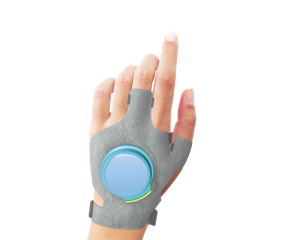GyroGlove' Helps Ease Hand Tremors In Patients With Parkinson's Disease

Parkinson’s disease is a progressive neurodegenerative disorder that affects movement; its most recognizable symptom is trembling hands. These tremors can make everyday activities like holding a glass of water or writing incredibly difficult. And while there are some potential treatment methods on the horizon, a new device might soon help Parkinson’s patients lead a more normal life.
The GyroGlove, developed by London medical student Faii Ong, has the potential to help Parkinson’s patients manage their tremors. Ong first had the idea to create the glove as a medical student when, while treating a 103-year-old Parkinson’s patient, he found it was difficult for her to eat soup. With nothing to ease her tremors, he built the GyroGlove, which uses the physics of mechanical gyroscopes to reduce trembling.
According to notes Ong provided to Medical Daily, the gyroscopes “are basically tops, or spinning discs. Like tops that try to stay upright, gyroscopes similarly seek to remain in the same position by conserving angular momentum. Thus, these gyroscopes instantaneously and proportionally resist hand movement.” When the gyroscopes are activated, Ong said, they make the trembling hand feel like it’s moving through syrup — the tremors are smoothed and damped, giving the hand full control.
The team at GyroGear tested out the glove on a wooden hand attached to a motorized rig that made it shake similarly to the way a Parkinson’s patient’s hand would tremble. Their first tests showed a nearly 90 percent reduction in the tremors caused by their rig. Further testing is now being conducted on patients with Parkinson’s and essential tremors — a nervous system disorder that causes rhythmic shaking in the hands.
The glove will help Parkinson’s patients lead more normal lives, according to Dr. Alison H. McGregor, a professor of musculoskeletal biodynamics and director of educational strategy and quality at the Imperial College London. “Being able to control or manage the tremor associated with Parkinson’s can make a range of daily tasks we all take for granted achievable from writing a letter [and] putting a key in the door to dressing and feeding yourself,” she told Medical Daily in an email.
Seeing it as a useful accessory for people with Parkinson’s, Sarah Webb, founder of the South London Younger Parkinson’s Network, praised its ease of use and the fact there are no side effects. “We can see results immediately,” she told Medical Daily. With an estimated 10 million people worldwide affected by Parkinson’s and another 200 million people suffering from essential tremors, ease of use and portability is essential to getting people’s lives back on track.
Still in its prototype stage, the glove will need to cater to more patients than just those with persistent tremors, Helen Matthews, COO of The Cure Parkinson’s Trust, told Medical Daily. “ Every person’s Parkinson’s is different, so what suits one person may not suit another,” she said. “One person may have persistent tremor, another sporadic events of tremor, so understanding the needs of each person and each potential customer is key in a project of this kind. ”
With more research, the glove may one day help patients with all types of needs. Ong and the rest of the GyroGear team hope to launch a crowdfunding campaign later this year, with a final product launch sometime in 2017.



























